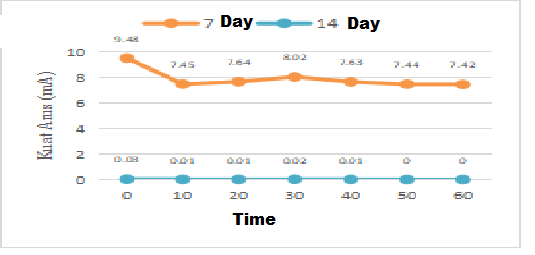Potential of vegetable waste as alternative production bioelectricity
Abstract
Energy use is closely related to world economic growth and urbanization. Therefore, research was carried out by utilizing organic vegetable waste as a source of renewable energy. This study aims to determine variations in incubation time of vegetable waste that affect electricity production and to determine differences in bio-electricity production based on variations in incubation time of vegetable waste. The results of bioelectricity measurements in the Microbial Fuel Cell reactor, the maximum production of bioelectricity is found at the incubation period of 7 days, namely 9.48 mA at the 0th minute (initial), the maximum electric voltage is 288 mV at the 60th minute, the maximum power is 2205.50 mW in the 30th minute, and the maximum power density is 152.10 mW/m2 in the 30th minute.
Downloads

Copyright (c) 2023 Theopilus Wilhelmus Watuguli

This work is licensed under a Creative Commons Attribution-NonCommercial-ShareAlike 4.0 International License.
Authors who publish with BIOEDUPAT: Pattimura Journal of Biology and Learning agree to the following terms:
- Authors retain copyright and grant the journal right of first publication with the work simultaneously licensed under a Creative Commons Attribution License (CC BY-NC-SA 4.0) that allows others to share the work with an acknowledgment of the work's authorship and initial publication in this journal.
- Authors are able to enter into separate, additional contractual arrangements for the non-exclusive distribution of the journal's published version of the work (e.g., post it to an institutional repository or publish it in a book), with an acknowledgment of its initial publication in this journal.
- Authors are permitted and encouraged to post their work online (e.g., in institutional repositories or on their website) prior to and during the submission process, as it can lead to productive exchanges, as well as earlier and greater citation of published work.








 This work is licensed under a
This work is licensed under a 